- Home
- Sandra Cisneros
A House of My Own Page 11
A House of My Own Read online
Page 11
While I was writing Mango Street, I remember reading Nicanor Parra’s Anti-Poems and loving their rebellion toward “Poetry,” just as I’d been delighted by Carl Sandburg’s wise-guy, working-class voice and Gwendolyn Brooks’s Bronzeville poems. I remember I was trying to write something that was a cross between fiction and poetry—like Jorge Luis Borges’s Dream Tigers, a book whose stories read like fables, but with the lyricism and succinctness of poetry.
I finished writing my book in November 1982, in Greece, miles from the Iowa cornfields. I traveled a great distance from the book’s inception, both physically and mentally. And in the meantime, lots of things had happened to me. I’d taught Latino high school dropouts and counseled Latina students. Because I often felt helpless as a teacher and counselor to alter their lives, their stories began to surface in my “memoir”; then Mango Street no longer was my story, but became all our stories. I arranged and diminished events on Mango Street as I came into my feminism. I gathered different parts of other people’s lives to create a story like a collage. I merged characters from my twenties with characters from my teens and childhood. I edited, changed, shifted the past to fit the present. I asked questions I didn’t know to ask when I was a teenager. But best of all, writing in a younger voice allowed me to speak, to name that thing without a name, that shame of being poor, of being female, of being not quite good enough, and examine where it had come from and why, so I could exchange shame for celebration.
In grad school, I’d never been trained to think of poems or stories as something that could change anyone’s life but the writer’s. I’d been trained to think about where a line ended or how best to work a metaphor. It was always the “how” and not the “what” we talked about in class. Even while I was teaching in the Chicano community, the two halves of my life were at odds with each other—the half that wanted to roll up my sleeves and do something for the community, and the half that wanted to retreat to my kitchen and write. I still believed my writing couldn’t save anyone’s life but my own.
In the ten years since Mango Street was first published those two halves of my life have met and merged. I believe this because I’ve witnessed families buying my book for themselves and for family members, families for whom spending money on a book can be a sacrifice. They bring a mother, father, sibling, cousin along to my readings, or I’m introduced to someone who says their son or daughter read my book in a class and brought it home for them. And there are the letters from readers of all ages and colors who write to say I’ve written their story. The raggedy state of my books that some readers and educators hand me to sign is the best compliment of all.
Am I Esperanza? Yes. And no. And then again, maybe. One thing I know for sure: you, the reader, are Esperanza. So I should ask, What happened to you? Did you stay in school? Did you go to college? Did you have that baby? Were you a victim? Did you tell anyone about it or did you keep it inside? Did you let it overpower and eat you? Did you wind up in jail? Did someone harm you? Did you hurt someone? What happened to Margarita, Fatboy, Gizmo, Angélica, Leticia, María, Rubén, Silvia, José, Dagoberto, Refugia, Bobby? Will you go back to school, find somebody to take care of the baby while you’re finishing your diploma, go to college, work two jobs so you can do it, get help from the substance-abuse people, walk out of a bad marriage, send paychecks to the woman who bore your child, learn to be a human being you’re not ashamed of? Did you run away from home? Did you join a gang? Did you get fired? Did you give up? Did you get angry?
You are Esperanza. You can’t forget who you are.
I Can Live Sola and I Love to Work
I wrote the following as a keynote speech for the national conference of the Women’s Caucus for the Arts, January 24, 1995, San Antonio, Texas. I often wove my creative writing into my speeches. As I’ve said before, the idea of delivering a speech scared me then; I didn’t feel I was an authority on anything, least of all me. But performing finished poetry or fiction made it easier for me to bridge my thoughts in between.
It’s interesting for me to reread this and remember how much Texas felt like home once. This was especially so when I found my tribe, a group of artists and art lovers whose careers intersected with my own, making my evenings effervescently social. But San Antonio is all about tribes, and once your tribe breaks up or migrates, you’re on your own.
I’m forty years old. I’m a writer earning her keep by her pen. I can live alone and I love to work. And since we’re in San Antonio, Texas, I feel it important to add I’m not related to Henry Cisneros, the ex-mayor and current secretary of housing, although I do have one brother, a cousin, two uncles, had a grandfather and a great-grandfather by that name. I mention this because I want to make it clear I didn’t grow up with family or political connections that might have opened doors for me. The truth is, I’m an uphol-sterer’s daughter, and there were a hell of a lot of doors I had to wedge open, not to mention kick down.*1
My aunt Lily (Eulalia Cordero) holding me in her arms on my baptism day, and my maternal grandmother, Felipa (María Romualda Felipa Anguiano de Cordero)
My mother is a housewife, her mother was a housewife, and her mother, and before her, who remembers? In my family, women are so anonymous their grandchildren don’t know their names, and if they’re remarked upon at all, it’s only to note who they married, who they gave birth to. These women, the so-and-sos, my ancestors. Who wanted to be like them? Not me, I thought—I wanted to be a who, as in the Who’s Who directory. I wanted something other than somebody’s mother, someone’s wife.
During my twenties, I wrote my first book of poetry and my first book of fiction. I was just out of graduate school, teaching high school because I was too afraid to apply for a teaching job at an institution of higher learning even though I had an MFA from the Iowa Writers’ Workshop. Applying for a job at a college or university might confirm my worst fears—that I didn’t belong in the world of letters, that I wasn’t smart enough, good enough. In graduate school, I often felt like an intruder, intimidated by the wealth and sophistication of my classmates. So how could I possibly feel I had anything to offer as an instructor? I took a job teaching high school dropouts in the barrio, and on weekends, when I wasn’t too exhausted, I tried to write.
I remember someone gave me a women’s calendar, and I cut out a Mary Cassatt quote, “I can live alone and I love to work,” which I taped to the refrigerator and repeated daily like a mantra. Every month, when the apartment was empty, when there wasn’t enough heat, when there was no new love or old to distract me, I would fall into a terrible grief and cry for hours. I couldn’t explain where all this sadness came from. Was this the writer’s life? The truth was, I didn’t like living alone and to hell with work. I wanted to be happy.
The twenties are a difficult decade for any woman, but I’d felt they were especially so for me. I was living alone; not unusual for a white woman, but a rare thing for a Mexican American daughter who had left her father’s house with neither husband nor child. Rather, I’d fled the racket of my parents’ home with poetry as my excuse. Solitude, I claimed, was the necessity of every artist.
My eldest brother hissed, “We know why you really want to be alone.” Fueled by my brother, Father suspected the worst—I had a sexuality. Like all Mexican fathers, Father wanted me to remain neuter until a man came to ask him for my hand, and if no one came to ask, neuter I was to remain, destined until death to the old maid’s task of “dressing saints.” I can joke about all this now, but back then it was terrible to receive my father and elder brother’s condemnation. I was no better than la Malinche, Hernán Cortés’s Mexican mistress, who aided the Spaniards in conquering Mexico. I had betrayed my culture, they said, and I was young enough to half-believe them.
Father blamed my college education for ruining me. After all, I was behaving just like those white women with loose morals, loose drawers, and loose ideas—like living alone without the support and protection of la familia. ¿Vas a vivir sola?
Sola. No one in my family lived solo, not even the men. They stayed home until marriage and sometimes did not leave even then.
Back then, crying was so much a part of my life, I assumed everyone cried as regularly as I did. At night in my drafty Chicago apartment, I prayed burglars wouldn’t break in and mice wouldn’t gnaw through the walls. Maybe Father was right. Where was the writer I imagined I’d be—happily tap-tapping on a typewriter in a house by the sea?
THE POET REFLECTS ON HER SOLITARY FATE
She lives alone now.
Has abandoned the brothers,
the rooms of fathers
and many mothers.
They have left her
to her own device.
Her nightmares and pianos.
She owns a lead pipe.
The stray lovers
have gone home.
The house is cold.
There is nothing on TV.
She must write poems.
I was writing a book called My Wicked Wicked Ways, which one male friend found disappointingly unwicked, but he was looking for wicked as defined by a man, or perhaps a white woman. And neither men nor white women could help me in my route to be an artist. I wouldn’t discover the Latina feminists until later. Because I knew no Latinas who could guide me, I had to invent myself, or reinvent myself, as Mexican feminist Rosario Castellanos so aptly put it. Until I met Norma Alarcón, then just a graduate student at Indiana University, I didn’t realize how difficult it had been for me to break out of that Bastille, my father’s house. My Chicana feminism began with Norma, by sharing our stories, comparing our escape routes out of our fathers’ houses, and claiming the right to a life of letters.
The poems from the My Wicked Wicked Ways manuscript earned me a national writing fellowship. My escape from the Midwest—at last!—first to Europe, and later to Texas—yes, sola. I have to admit moving to Texas was one of my years of terror, worse than traveling to a foreign country where I didn’t speak the language. After Europe, Texas was a foreign country to me; when I arrived in 1984, I thought I’d landed in Macondo, that sleepy jungle village from Gabriel García Márquez’s One Hundred Years of Solitude. This couldn’t be the United States. It was as magically unreal as Latin America. How, for example, could a city so undeniably Mexican hail itself on taxi placards as “San Antonio, All American City”? Or where else would a parrot find its picture on the front page of the newspaper beneath the headline “Called to the Witness Stand”? It was wonderful or scary, depending on your point of view.
I’d expected the women’s community to take me in, for it to be there for me as it had been in the Midwest, but the community of women I found in San Antonio was fractured, divided by color and class, and isolated from itself, let alone from communities beyond its own region. Like the citizens of Macondo, I found it a community locked in its provinciality, still discovering ice, still discovering that the world is round. I was surprised it was the gay community that sheltered and nurtured me, specifically the Latino visual artists, and they are still, for the most part, the crowd I run with. I reason this is because they too understand about having to reinvent oneself, about taking from tradition that which nurtures and abandoning the elements that would mean self-destruction.
I have a theory—one’s most charming trait is also one’s fatal flaw; the one thing you like about somebody is usually their worst defect as well. So too with communities. The comadre-ismo, as I’ve witnessed it, has kept other women out. On the other hand, the opposite extreme of this xenophobia is the over-nurturing among the women that creates the “That’s nice, mi’ja” syndrome, which doesn’t help anybody in the long run and fosters mediocrity.
As a Latina, I don’t want to inherit certain legacies. I don’t want to inherit mothers laying down their lives like a Sir Raleigh cloak and asking everyone to step all over them. I don’t want to inherit my mother’s fear of doing anything alone or her self-destructive anger. I don’t want to inherit my paternal grandmother’s petty jealousies and possessiveness. I don’t want to inherit my maternal grandmother’s silence and passivity.*2 I don’t want to quedar bien, be nice, with the men around me at the expense of my own dreams and happiness. I don’t want to be the mother of twelve children, seven, five, even one, but I do want to write stories for one child, five, seven, twelve, a million children.
I do want to inherit the witch in my women ancestors—the willfullness, the passion, ay, the passion where all good art comes from as women, the perseverance, the survivor skills, the courage, the strength of las mujeres bravas, peleoneras, necias, berrinchudas. I want to be una brava, peleonera, necia, berrinchuda. I want to be bad if bad means I must go against society—el Papá, el Pápa, the boyfriend, lover, husband, girlfriends, comadres—and listen to my own heart, that incredible witch’s broom that will take me where I need to go.
I do want to create art beyond rage. Rage is a place to begin, but not end. I’m not as wise as my work, but I know if I take the writing deep enough, something larger and greater than myself will flash forth and illuminate me, heal me. I do want to devour my demons—despair, grief, shame, fear—and use them to nourish my art. Otherwise they’ll devour me.
There are nights like a Gethsemane when I’m overwhelmed, by the work, the loneliness of my life as a writer, and wonder why I didn’t take up something more sociable, like becoming a flamenco dancer or an opera diva, but I’m sure flamenco dancers and opera divas have the same complaints.
I’m convinced if we’re to be artists of any worth we must lock ourselves in a room and work. There are no two ways around this one, no shortcut, no magic word to save the day. Take it as a given, you’ll cry, despair, think you’ll die, that you can’t possibly do it, that it’s a lonely task, you’ll lose faith in yourself, especially at night. But when you finish crying and despairing, you can wipe your eyes and…the work is still there waiting. So you better roll up your sleeves and get moving, girl! Nobody’s going to do the work for you. If you’re serving others other than your art, then it just takes longer. In the words of Tillie Olsen, “Evil is whatever distracts.”
And please don’t come out of that workroom until the work is finished, otherwise you’re liable to enter into “The Emperor’s New Clothes.” Your friends are likely to say, “Isn’t it beautiful, isn’t it lovely,” because no one has the nerve to tell you the truth. Again the “That’s nice, mi’ja” syndrome. We can’t afford as women to be mediocre, or even good, especially not now. We don’t have that luxury. Our best weapon in adverse times—excellence.
What grieves me after ten years of living here in Texas is that there are still women spinning straw into straw, or into brass, or into lesser metals, women doing the same art they were doing ten years ago or very little beyond it, which means they haven’t given their art the time it deserves. At first I listened sympathetically to their tales of woe, but after ten years the victims are still victims, women carrying their little gray cloud on a stick—the husband who left, or the one they won’t leave. And frankly I don’t want to hear about your kids. We make choices. I’m not going to blame you because I’m childless; true, there is no one to get in my way, but there is also no one there to hug me when I need to be hugged.
We must spin our own straw, not our neighbor’s. “Tell the truth. Your truth,” the writer Dorothy Allison has written. There is power in your work if you come at it from that place uniquely yours, not your sister’s, but yours. Otherwise we risk creating stereotypes. If I see another work of art that glorifies la abuelita, I’m going to throw a berrinche. Aren’t our grandmothers worth portraying with all of their sins, and, frankly, women with sins are more interesting than santas.
After ten years of wandering I’ve found the house in the heart, the place where I belong. Ten years have passed since circumstances first brought me here, and though I’m self-employed now and could live anywhere, I’ve chosen San Antonio as my home. I’ve found finally a place that is all about self-invention. For me these borderla
nds match my interior landscape of being both Mexican and ’Merican at the same time.
I’m forty. I can live sola and, as much as I complain, the truth is, I really do love to work. In fact, I’m at my healthiest, happiest when I’m working. I didn’t know my grandmothers, the so-and-sos, but I know my task is to invent their lives, or reinvent them, as the case may be, to give them names, to name their fears, sins, pettiness, dreams, secrets, shames, lies, pride, and power. Perhaps I’m lucky not knowing them. I’m not, after all, constricted by the truth and can give my imagination full rein. I like to think I’m inventing the truth. I’m listening to voices nobody listened to, setting their lives down on paper how many years later? And that writing is a resistance, an act against forgetting, a war against oblivion, against not counting, as women.
* * *
*1 Rereading this at fifty-nine years of age, almost twenty years later, I want to add there were and are a lot of women I have to thank who opened doors for me and continue to shove me forward. Their names are in the acknowledgments as well as scattered throughout these pages.
*2 When I originally wrote this essay, I took my mother’s version of her mother for granted. Now that I’m older I realize my mother didn’t like or know her own mother very well and dismissed her by claiming she was weak and passive, and implied she didn’t want to be like her. What she saw as her mother’s weak, passive behavior, I now recognize as strength and resilience. My maternal grandmother, Felipa Anguiano de Cordero, had to endure a great deal of physical and mental duress in order to survive. As a young girl, she was hidden under clay pots when the government or rebels descended on her village, in order to save her from rape. She was “abducted” by her husband-to-be, and had to make do and accept him as her husband because she had no other choice. In her lifetime, she endured the death of several children, both as babies and as adults. She emigrated with toddlers in hand and was possibly pregnant during her voyage north from Mexico to the States, all this during the violence of the Mexican Revolution. She had to make a new home for herself and her family in several U.S. towns, sometimes living in tents, before finally relocating to Chicago just before the Great Depression. At the end of her life she learned how to read. And—she had second sight, she could see with more than her eyes. This to me doesn’t appear to be a weak woman. I look up to her now as a woman of great mental strength, fortitude, and courage.

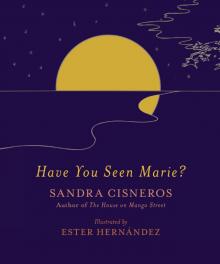 Have You Seen Marie?
Have You Seen Marie?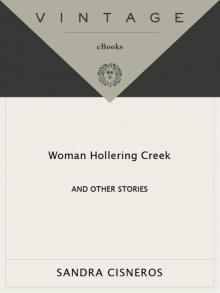 Woman Hollering Creek: And Other Stories
Woman Hollering Creek: And Other Stories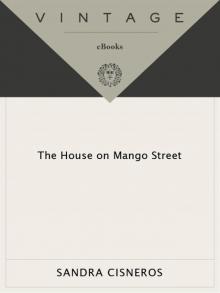 The House on Mango Street
The House on Mango Street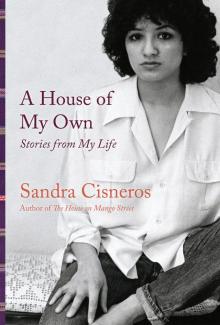 A House of My Own: Stories From My Life
A House of My Own: Stories From My Life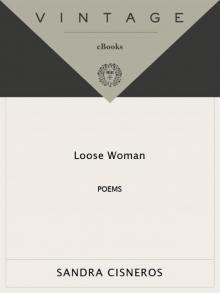 Loose Woman
Loose Woman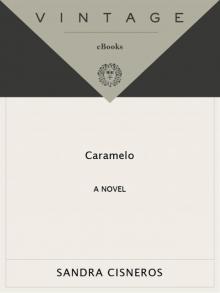 Caramelo
Caramelo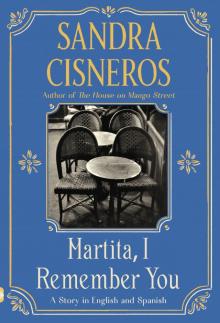 Martita, I Remember You/Martita, te recuerdo
Martita, I Remember You/Martita, te recuerdo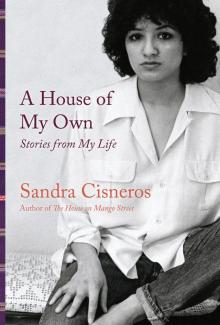 A House of My Own
A House of My Own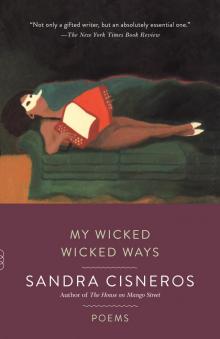 My Wicked Wicked Ways
My Wicked Wicked Ways